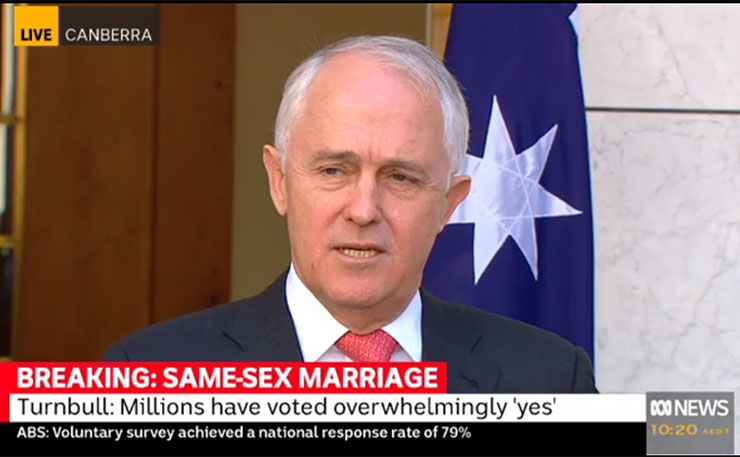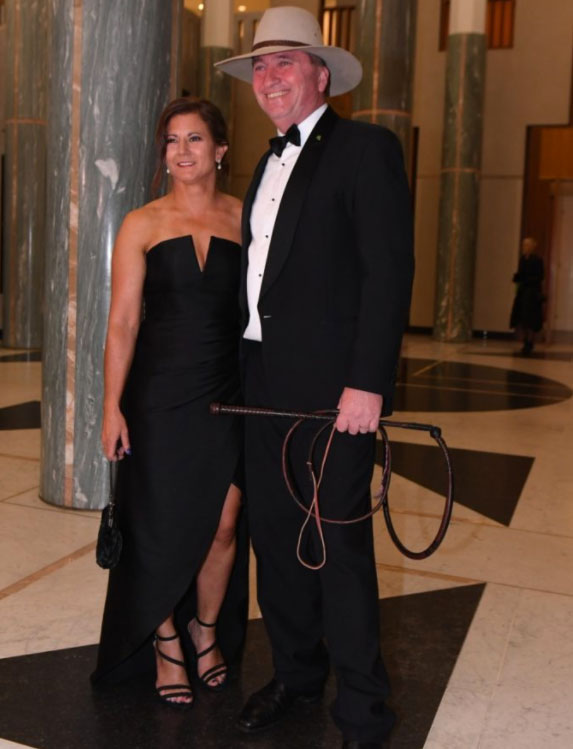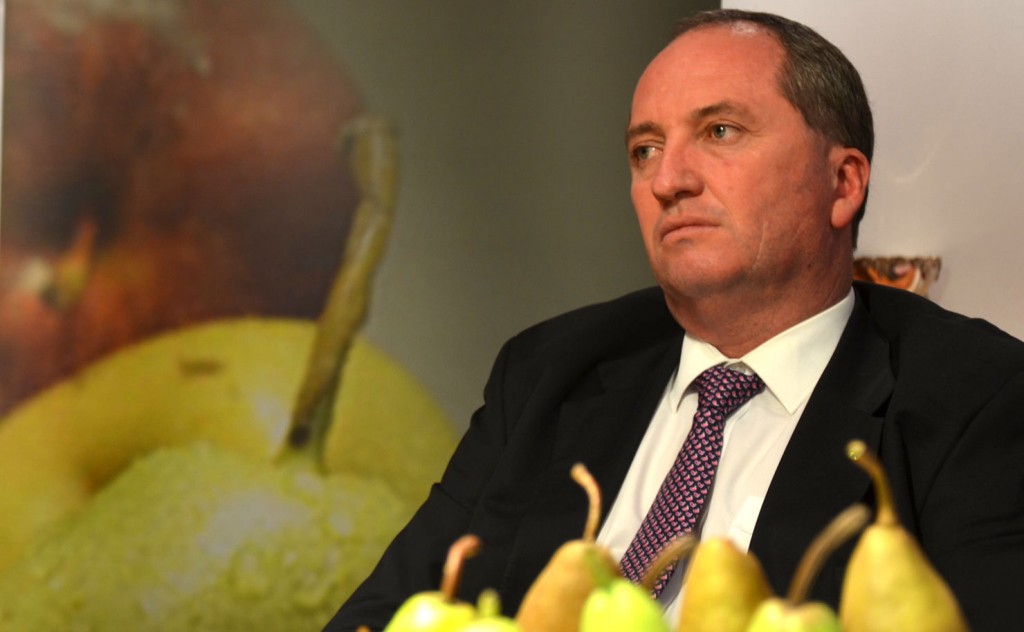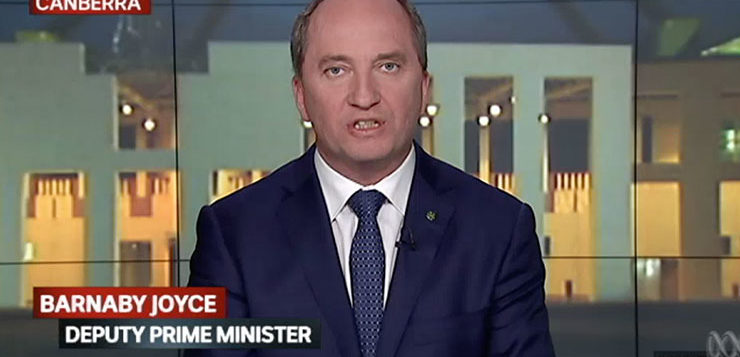An old-fashioned sex scandal has exposed deep rifts within the Coalition. The long-term results do not augur well for our democracy, writes Ben Eltham.
Even for someone accustomed to the rough and tumble of politics, the past fortnight has been a dispiriting spectacle. The dissolution of a family and the further debasement of political standards was never going to make for happy travels, but something about the Barnaby Joyce scandal has been especially disheartening.
By now the sordid details are well known: Deputy Prime Minister Barnaby Joyce, after pursuing an affair with his former staffer Vikki Campion, has left his wife Natalie and is now living with Campion in a rent-free townhouse in Armidale, provided by a political donor. Campion was moved from Joyce’s office after the relationship became obvious to other staffers and political insiders, and given a succession of highly paid jobs in the offices of other National Party politicians.
The bare bones of the scandal, thus laid out, hardly suggest the orgy of prurience that has engulfed the Australian political and social media since the Daily Telegraph broke the news of the affair last week. At every stage, the controversy has shown us base motivations, dishonesty, self-interest, and political expediency.

By the end of the week, the scandal had exposed deep rifts in the federal Coalition, with the Prime Minister and Deputy Prime Minister at each other’s throats in dueling media conferences. The extraordinary scenes recalled the darkest days of the Gillard government, when factional politics and personal hatreds tore a sitting government apart, souring voters’ views on Australian democracy in the process.
There can be no doubt that this scandal has destroyed Barnaby Joyce’s political career. While he has tried to dig in and ride out the controversy, it seems highly unlikely he can continue as the leader of the Nationals in the long term. Even if Joyce can limp on in the role, he has been gravely wounded. Joyce’s most valuable political asset – his knockabout personal popularity in regional Australia – has surely been dealt a crippling blow.
Conservative politics is a tough game. It requires high levels of political acumen and the support of key power constituencies in the media, party base and the electorate. Joyce is in trouble with all three. The Daily Telegraph has devoted 10 front pages in a row to his travails, the party base is angry, and many voters are clearly less than impressed with his behaviour.
Rather than the initial news of the affair and the breakdown of his marriage, it has been the subsequent revelations regarding Campion’s staffing arrangements and the rent-free townhouse that have really proved damaging for Joyce. Many would be prepared to forgive a politician for personal moral failures. But there is far less tolerance for the gift of a lucrative job to a girlfriend, or the luxury of free rent in a nice house owned by a wealthy mate.
While the damage to Joyce has been catastrophic, the damage to the government has been nearly as bad. Any hope of a good start to the year for the Coalition has been blown away. At a time when the economy is clearly improving, Scott Morrison can barely get a media mention.
The affair has also damaged the prime ministership of Malcolm Turnbull – not because of anything he has done, but because of the general atmosphere of sleaze that has now enveloped the government.
Accusing the Deputy Prime Minister of a “shocking lack of judgment,” Prime Minister Malcolm Turnbull last week pointed to the obvious problems inherent when elected ministers are pursuing relationships with public employees on their own staff.
On the one hand, it could be argued that Turnbull made a positive move by banning sex between ministers and staffers. Federal politics is murky enough without undeclared conflicts of interest in the offices of ministers and senior bureaucrats. Raising the standards of personal ethics in politics is plainly in the interests of our democracy.

But Turnbull will pay a high price for unilaterally announcing the reform. By admonishing his deputy in such a peremptory manner, he has stored up much future enmity in the Nationals.
With nothing to lose, Joyce came out swinging in Friday’s remarkable morning media conference. Donning an Akubra (strange attire for Parliament House, as many noticed), Joyce defended the independence of the Nationals and attacked his leader as “inept”. The spectacle of the two most senior members of the government attacking each other can hardly improve the Coalition’s standing with voters.
Indeed, the future of the Coalition itself seems suddenly at stake. While no-one expects the Nationals to blow up a sitting government, the public instability is manifestly damaging. Turnbull and Joyce had a meeting on Saturday to try and make amends, but one suspects there will be plenty of drama to come. Political feuds have a way of sustaining themselves, and Joyce will fight desperately to retain his untenable leadership.
If we step back from the calculations of power politics for a minute, the Joyce saga has uncovered all sorts of uncomfortable truths about Canberra and its insiders. Let’s examine three: the weakness of the ministerial code of ethics; the power of ministerial staffers; and the irresponsibility of the political media.
An open-and-shut breach of the Ministerial Standards
The most obvious lesson from the Joyce imbroglio is that the Statement of Ministerial Standards is essentially useless. Often called the ‘code of conduct’, the Standards set out some high-minded guidelines for ministers and assistant ministers – the holders of executive office in Australia’ parliamentary system.
“In recognition that public office is a public trust, therefore, the people of Australia are entitled to expect that, as a matter of principle, Ministers will act with due regard for integrity, fairness, accountability, responsibility, and the public interest, as required by these Standards,” the Statement reads.
But the Joyce saga shows that such lofty sentiments are honoured chiefly in the breach. No code of ethics can by itself prevent bad behavior, of course. But for any code to be useful, it needs a clear and consistent interpretation, and penalties for those break it. The current Ministerial Standards have neither, as the Joyce saga shows.
According to Malcolm Turnbull, Barnaby Joyce has not breached the Ministerial Standards. This is bizarre.
Even before Turnbull updated the code on Friday, the Statement expressly forbade ministers giving jobs to staffers who they were in relationships with. Joyce’s explanation is that, at the time Campion was variously employed in ministerial offices, she was not in a relationship with him. This is scarcely believable, given the timeline of events.
But even if we accept that, it’s hard to see how Joyce did not act in contravention of section 1.3(i) of the Standards, which states that:
Ministers must ensure that they act with integrity – that is, through the lawful and disinterested exercise of the statutory and other powers available to their office, appropriate use of the resources available to their office for public purposes, in a manner which is appropriate to the responsibilities of the Minister.
It’s very hard to argue that the employment of Vikki Campion, in specially created roles in the offices of Matt Canavan and Damian Drum, was an “appropriate use of the resources available to their office for public purposes.”
And then there is the issue of the rent-free townhouse owned by prominent New England businessman Greg Maguire.
The Standards state that Ministers “must not seek or encourage any form of gift in their personal capacity”. It’s hard to know how else you would describe the gift of rent-free accommodation.
Section 2.22 states:
“Ministers shall ensure that they do not come under any financial or other obligation to individuals or organisations to the extent that they may appear to be influenced improperly in the performance of their official duties as Minister.”
As the Minister for Agriculture and Water Resources until October 2017, Joyce relocated a federal agency, the Australian Pests and Veterinary Medicines Authority, to Armidale, in his own electorate. Greg Maguire owns one of the major hotels in Armidale, the Powerhouse, and APVMA bureaucrats have been staying there regularly in the relocation.
Maguire himself told The Australian’s Rick Morton “if I can grow my city and grow my region, that’s good for my business and good for my community.”
As Labor’s Mark Dreyfus told reporters on Thursday: “I’m not sure why the Prime Minister has found it so difficult to apply the Standards in the state that they currently they are.
“They’ve got provisions that deal with and prohibit Ministers seeking or encouraging gifts in their personal capacity,” Dreyfus continued. “They’ve got provisions which say directly, quite clearly, that someone with whom you are in a relationship should not be found a job in your office. And someone with whom you are in a relationship should not be found a job in the office of another Minister. But that’s what’s happened here.”
But it doesn’t really matter, because in the end, the Code is judged by the Prime Minister. If the Prime Minister rules that it has not been breached, then it hasn’t. There is no independent enforcement.
In a perceptive blog post, the Ethics Centre’s Simon Longstaff (someone we’ve written about before at New Matilda) called it a “cynical manipulation of language to distort the plain meaning of the Ministerial Code of Conduct”.
The Guardian’s Katharine Murphy made a similar point. “The week has proven, should that proof have been necessary, that the code governing the professional behaviour of some of the most powerful people in the country is entirely discretionary, both in the drafting and in the subsequent enforcement.”
Staffers: an unaccountable elite
The Joyce scandal also shows us something very interesting about the power of ministerial staffers.
The life of a staffer is nasty and short, although the perks of office mean it is not altogether brutish. The high pay only partly makes up for the long hours and the bad company. The work is precarious: should a minister fall, staffers are out of a job, often within hours.
But while staffers have a terrible work-life balance, they have excellent political connections. This group of public employees are perhaps the ultimate political insiders. Paid by the taxpayer but loyal only to their minister, staffers are largely anonymous, and yet wield enormous sway in the halls of power.

Staffers are immensely important in policy development, acting as the conduit between elected ministers and senior public servants. Staffers often stand in for or alongside ministers in very senior briefings, as we saw when we discovered Peta Credlin was participating in the Abbott government’s cabinet meetings. It is not uncommon for political staffers to verbally brief, or even issue commands, to senior bureaucrats and public officials – all in the name of their minister, of course.
But staffers are not judged by the same standards as public servants. As Campion’s progress shows, staffers regularly travel around the offices of various ministers, popping up here as a media advisor, there as a policy advisor. Ex-staffers often vanish from high-paying jobs in a ministerial office, only to re-emerge in positions of influence in party offices, lobby groups, or like-minded think tanks. Some go on to run for parliament themselves. Wayne Swan’s former staffer Jim Chalmers is now a Labor front-bencher; Credlin has of course moved to the media.
In summary, staffers have lots of political influence, but very little public accountability. It is high time we thought harder about how to make their essential contribution to politics much more transparent.
The moralising media
Finally, no discussion of the Joyce scandal can ignore the pernicious role of the media. The media’s role in this sorry tale shows us some worrying developments in Australia’s public sphere.
Let us take the way the media has treated Vikki Campion. It has not been pretty. Stalked and photographed by a Murdoch paparazzo, heavily pregnant and in leisure wear, Campion has been objectified and demeaned in a manner that recalls Christine Keeler or Monica Lewinski. While the Daily Telegraph has been craven, social media has been vicious and defamatory. Campion is reportedly “in hiding” – by which we mean: in hiding from the media.
 And yet no-one can credibly claim Vikki Campion has herself much wrong. She left Joyce’s office when the relationship started. She presumably declared the conflict of interest when moving jobs to work for Canavan and Drum. Arguably, Campion is guilty of nothing but engaging in a consensual relationship with her boss: a position many a human has been in, but for which few have suffered for as greatly in scrutiny.
And yet no-one can credibly claim Vikki Campion has herself much wrong. She left Joyce’s office when the relationship started. She presumably declared the conflict of interest when moving jobs to work for Canavan and Drum. Arguably, Campion is guilty of nothing but engaging in a consensual relationship with her boss: a position many a human has been in, but for which few have suffered for as greatly in scrutiny.
The sudden explosion of the scandalous affair has also revealed the seamier side of social and independent media. In covering the affair, a number of independent websites pushed the bounds of defamation law to its limit – and probably beyond. There were a slew of partisan and misogynistic tweets and posts aimed at Campion. Many commenters also turned their sights on the ‘mainstream media’ and the ‘Canberra press gallery’ for supposedly covering up what had been an open secret in political circles.
This prompted agonized opinion pieces from prominent journalists in which they tied themselves in knots trying to explain why they did not report on the affair and subsequent break-up of the Deputy Prime Minister’s marriage, as though the sexual conduct of Joyce was in itself newsworthy. Sadly, but perhaps not surprisingly, many journalists concluded that yes, who the Deputy Prime Minister was shagging was indeed news, and they were sorry they didn’t get the story earlier. Even the ABC’s Media Watch thought that Joyce’s sex life was a worthy story, another black mark on the ethical judgment of that program.
Journalists have used the facts that have come to light since the Joyce affair broke to argue that it was in the public interest all along. As I’ve argued above, Joyce’s free accommodation and the Nationals’ employment of Campion undoubtedly do deserve public scrutiny. But these revelations came after the initial coverage of his sex life, which does not.
Writing in The Conversation, respected journalism scholar Denis Muller observed that “the story that broke was coloured by the salacious moralism beloved of tabloid newspapers since time began”. It’s hard to disagree. For the tabloid Daily Telegraph and many of the journalists following in its wake, the protestations about ministerial standards and “public money” being paid to Ms Campion are simply a handy disguise for a good old-fashioned public shaming.
What might account for the public need to blame and shame? In a word, hypocrisy. The anger that burned hot against Joyce was prurient and partisan, but all the more understandable for that. Ordinary voters feel, with ample justification, that there are two sets of rules: one for the rich and powerful, and one for the little people who lack the luxury of connections and wealth.

Barnaby Joyce is a conservative politician who was only too happy to cloak himself in the raiment of traditional marriage. He is a politician who championed a public marriage survey that subjected LGTBIQ Australians to the most vicious innuendos and assaults. He is the second in charge of a government that relentlessly pries into the most private aspects of the lives of welfare recipients, including who they are sleeping with.
It’s worth repeating a point that has been made a number of times on social media this week: were Barnaby Joyce collecting Newstart, Centrelink would absolutely consider that he and Ms Campion were partners. Centrelink states unambiguously that “any sexual relationship” is one of the criteria for considering somebody a “member of a couple”.
Of course, Joyce is not on welfare. But this just underlines the very different standards that the government applies to citizens, compared to those it pretends to impose on itself.
What about policy?
And here is the greatest tragedy of the Joyce affair: it has distracted us from what really matters. What matters is policy.
Policy is the tool by which governments intervene in the lives of voters, and it is for that reason that journalists should seek to report policy first, and foremost.
Ask yourself this: if Barnaby Joyce resigns, what government policies will change? Will the Turnbull government suddenly abandon offshore detention of refugees, or its determination to slash company tax? Will the National Party suddenly change its opinion on irrigation in the Murray Darling, or on the value of the Carmichael coal mine? Of course not. The next leader of the Nationals will almost certainly pursue these very same policies.
It is true that the public is interested in the Deputy Prime Minister’s sex life. But, as the old saying goes, the interest of the public is not the same as the public interest.
Donate To New Matilda
New Matilda is a small, independent media outlet. We survive through reader contributions, and never losing a lawsuit. If you got something from this article, giving something back helps us to continue speaking truth to power. Every little bit counts.




